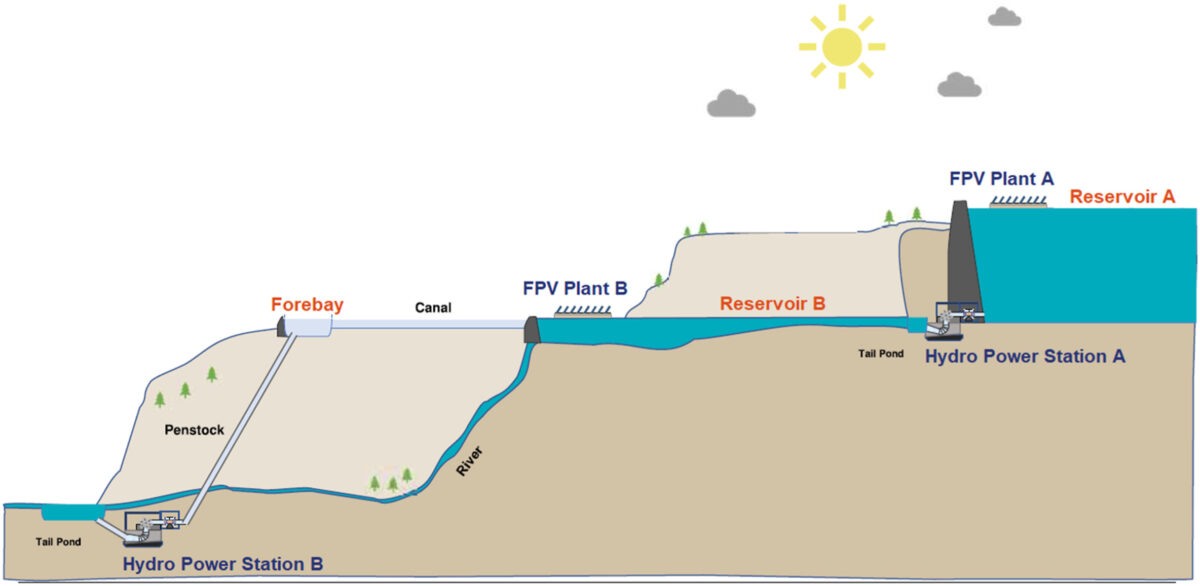A study by researchers at the Institute for Energy Technology in Norway has analyzed the techno-economic feasibility of the hybridization of a hypothetical cascade hydropower system with floating photovoltaics (FPV) and ground mounted photovoltaics (GPV) under sub-Saharan African market conditions. In this type of hybrid system, an upstream reservoir is connected to a downstream reservoir, and the FPVs can be installed on each reservoir.
“This study aims to highlight how operation under round-the-clock tariff-based and varying energy pricing with and without load commitments affects the optimal dimensioning of the grid-connected utility-scale hybrid system,” the scientists said, noting that hybridizing utility-scale PV with hydropower can be “a feasible way to reduce the seasonal variability in renewable energy generation.”
The study found that annual producer profits for a hybridized hydro system increased by 18-21% and 0-4% for a three-tariff power purchase agreement (PPA) scheme and spot market scheme, respectively, compared with a hydro-only system in sub-Saharan African market conditions. It also found that hybridization with single-axis tracking GPVs can be a “techno-economically more feasible option compared to the FPV system” due to the lower capex and higher energy yield of the GPV.
“Furthermore, it is estimated that the capex of FPV should be around 42–57% lower than that of ground-mounted PV (GPV) with single-axis tracking for the hydro-FPV system to reach the same annual producer profit as the hydro-GPV system,” the researchers explained.
They based the techno-economic assumptions for both the FPV and GPV systems on estimates from the US Department of Energy's National Renewable Energy Laboratory’s cost benchmarking for PV systems, with capital and fixed operating expenses related to the incumbent hydro system being considered sunk costs. For the power market condition inputs, the paper used historical Southern African Power Pool (SAPP) spot price market data from 2014 to 2021.
The case study also assumes the connection of the hybrid system with the national grid, with a maximum power output of 126 MW. In addition, the paper proposes a “linear programming model for optimal dimensioning/scheduling of a hybrid hydro-FPV system.”
During a dry weather year, hydro plant hybridization with FPVs can compensate for the reduced hydropower output, resulting in a 4% increase in annual producer profits. In wet weather years, however, hybridization of the hydro plant with FPV was not observed to be economically feasible, while in median years, only a negligible increase in annual producer profits (less than 0.1%) can be achieved, due to grid capacity limits on the potential for the FPV to participate in the spot market during peak price hours. “Moreover, the hydro-GPV system is observed to generate higher annual producer profits compared to the hydro-FPV system in all analyzed scenarios (around 13–18%),” the paper noted.
The findings are available in the report “Techno-economic feasibility of hybrid hydro-FPV systems in Sub-Saharan Africa under different market conditions,” published in Renewable Energy.
“The results highlight the effects of different market schemes and varying weather years on the hybrid system dimensioning and operation. However, in the long-term modeling, the robustness of the results could be improved by including stochastic optimization methods in the techno-economic analysis of the hybrid-FPV systems,” the researchers concluded.
This content is protected by copyright and may not be reused. If you want to cooperate with us and would like to reuse some of our content, please contact: editors@pv-magazine.com.




By submitting this form you agree to pv magazine using your data for the purposes of publishing your comment.
Your personal data will only be disclosed or otherwise transmitted to third parties for the purposes of spam filtering or if this is necessary for technical maintenance of the website. Any other transfer to third parties will not take place unless this is justified on the basis of applicable data protection regulations or if pv magazine is legally obliged to do so.
You may revoke this consent at any time with effect for the future, in which case your personal data will be deleted immediately. Otherwise, your data will be deleted if pv magazine has processed your request or the purpose of data storage is fulfilled.
Further information on data privacy can be found in our Data Protection Policy.